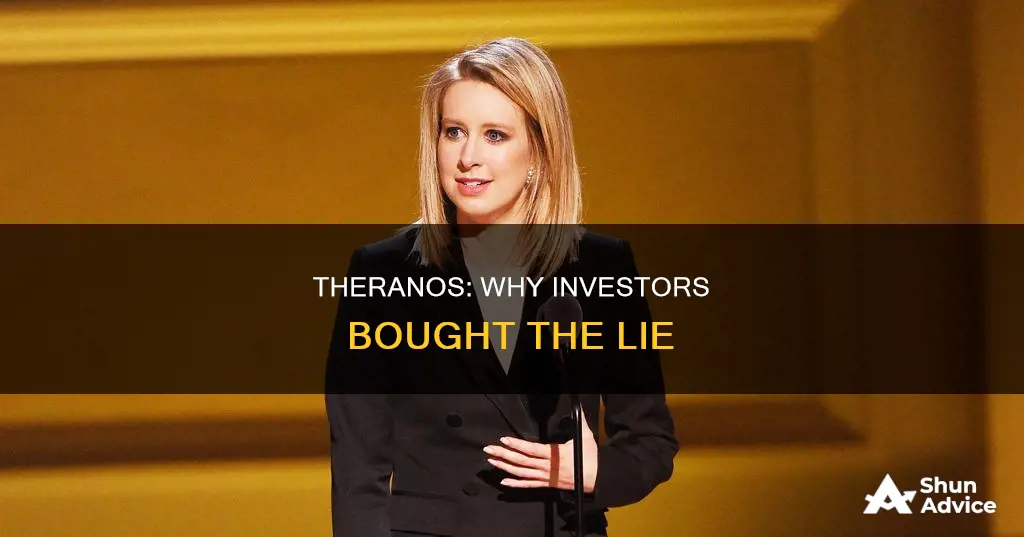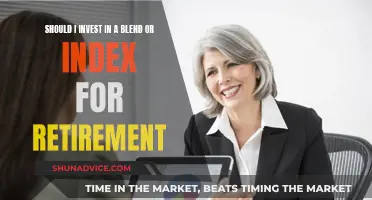
Theranos, a Palo-Alto-based healthcare start-up, attracted hundreds of millions of dollars in investments over the span of its life. At one time, the firm reached a valuation of $9 billion. The company, led by Elizabeth Holmes, claimed that its device could conduct various kinds of tests based on only a few drops of blood. However, in 2015, the company started to collapse after a Wall Street Journal reporter, John Carreyrou, exposed the questionable efficacy of Theranos' technology. So, why did people invest in Theranos?
| Characteristics | Values |
|---|---|
| Investors' wealth | Individual worth exceeding $1 million |
| Investor type | Private, accredited investors |
| Investor profile | High-profile investors, such as Rupert Murdoch, the Walton family, and the DeVos family |
| Investment size | $100 million checks |
| Investment motivation | Compelling mission, assumption of due diligence by other luminaries, emotional draw of Theranos's mission, celebrity status of CEO Elizabeth Holmes, lack of transparency, bandwagon effect |
| Investor due diligence | Superficial due diligence, confirmation bias, trust in Theranos's claims of disruptive technology |
| Investor risk assessment | Focus on typical risks such as demand, talent attraction, and product development, rather than fraud or data falsification |
| Investor protection | Lack of transparency requirements for private companies, legal loopholes allowing lab-developed tests to sidestep FDA safety trials |
| Investor influence | Influential backers, such as a famous lawyer, relationships with the White House and the Clintons |
What You'll Learn

Elizabeth Holmes' personal connections
Elizabeth Holmes's personal connections and ability to recruit the support of influential people played a significant role in Theranos's credibility and success in attracting investors. Holmes's connections included several US presidential cabinet officials, such as Henry Kissinger, George Shultz, James Mattis, and Betsy DeVos.
Holmes's first major investor was Tim Draper, a Silicon Valley venture capitalist and father of Holmes's childhood friend, who invested $1 million in Theranos. Draper has continued to defend Holmes even after the fraud allegations and charges.
Holmes's ability to attract influential people to her circle of supporters is evident in her recruitment of Stanford professor Channing Robertson as her mentor and the first board member of Theranos. Robertson helped Holmes gain scientific credibility and received a lavish salary in return. He spent a significant period defending Holmes and Theranos against critical questions and doubts about the effectiveness of the technology.
In 2011, Holmes met former US Secretary of State George Shultz, who soon became a Theranos board member. With Shultz's connections and support, the Theranos board was filled with other influential people from politics and business over the next few years. These included former Secretary of State Henry Kissinger, former Secretary of Defense William Perry, former General Jim Mattis, and former Wells Fargo Bank CEO Richard Kovacevich.
Holmes also received funding from well-known individuals and families, including $150 million from Walmart's founding Walton family, over $120 million from media mogul Rupert Murdoch, and $100 million from former Secretary of Education Betsy DeVos. All these investors lost their money when Theranos collapsed.
In addition to her professional connections, Holmes's personal relationships also impacted Theranos. She was in a clandestine romantic relationship with Theranos president and COO, Ramesh "Sunny" Balwani, which was not disclosed to investors. Balwani joined Theranos in 2009 and became Holmes's number two, despite having little relevant experience. He was known for his fiery temper and bullying behaviour towards employees.
In summary, Elizabeth Holmes's personal connections and networking skills played a crucial role in attracting investors and building Theranos's credibility. She successfully recruited influential individuals from politics and business to her circle of supporters, leveraging their reputations to enhance Theranos's image. However, the company's eventual downfall and fraud allegations also impacted the reputations of those associated with it.
Investments: Where People Put Their Money Now
You may want to see also

Lack of transparency requirements
Theranos, a Palo-Alto-based healthcare start-up, thrived in an environment with minimal transparency requirements. As a private company, Theranos had few legal obligations to disclose information about its earnings, annual reports, or technology. This lack of transparency allowed Theranos to operate with minimal scrutiny and enabled the company to make exaggerated and false claims about its technology and business performance without consequence.
The company's leadership, including founder and CEO Elizabeth Holmes, took advantage of this lack of transparency to attract investors. Holmes leveraged her personal connections and family wealth to access high-profile investors, including Tim Draper, Victor Palmieri, and Rupert Murdoch. She also cultivated relationships with influential individuals and entities, including the White House, the Clintons, and the prominent lawyer David Boies, who all attended board meetings. These connections created a bandwagon effect, attracting even more investors and funds.
The healthcare industry's complexity also played a role in Theranos's ability to operate with minimal transparency. Investors found it challenging to assess the effectiveness of healthcare technologies, relying instead on narratives and emotional appeals during early-stage funding cycles. Holmes exploited this by sharing a personal anecdote about her uncle's death from skin cancer and promising that Theranos's blood-testing technology would save lives. This combination of a strong vision and emotional appeal attracted supporters and investors.
Theranos also benefited from a legal loophole that allowed them to bypass safety trials issued by the Food and Drug Administration (FDA) for lab-developed tests in a single laboratory. This loophole further reduced the transparency and accountability required of Theranos, enabling the company to make unattainable short-term promises to secure funding. As a result, a significant gap emerged between the company's actual technology and its vision, leading to a swift and scandalous collapse when the truth was exposed.
Mutual of America: Worth the Investment?
You may want to see also

Emotional appeal of Holmes' vision
Elizabeth Holmes, the founder of Theranos, was able to attract many investors by selling a vision that had a strong emotional appeal. Holmes often spoke about her uncle, who had passed away from skin cancer, and how the blood-testing technology would save lives so that "less people [will] have to say goodbye too soon". She combined a vision of a world made better through technology with a personal anecdote, which helped her gain the trust of investors.
Michael Greeley, General Partner of Flare Capital Partners in Boston, suggested that Theranos's later-stage investors were swayed by the emotional draw of the company's mission to democratize blood testing, coupled with Holmes's celebrity status. Greeley explained that investors were "romantically, passionately swayed" by Theranos's mission, and accepted the company's claims of a disruptive technology at face value.
The emotional appeal of Holmes's vision was further amplified by her charismatic personality and ability to charm potential investors. In the case of Walgreens, for example, Holmes convinced the company to invest in Theranos without ever seeing the technology at work. She did this by speaking to the medical director's past accomplishments and her desire to revolutionize medicine in the same way he had.
The result of Holmes's emotional appeal was a web of influential backers and a business that was ultimately built on smoke and mirrors. Theranos raised millions of dollars based on exaggerated and falsified claims about its technology and business performance.
Shiba Inu: Who's Invested?
You may want to see also

Support from high-profile investors
Theranos attracted a number of high-profile investors, including Rupert Murdoch, the Walton family, Betsy DeVos, and the Cox family. The company also had the support of David Boies, a famous lawyer, who sat at every board meeting.
Rupert Murdoch, the Australian media mogul who owns Fox News, the Fox Network, The Wall Street Journal, and HarperCollins, invested $125 million in Theranos. Murdoch has a net worth of around $22.3 billion. It was revealed that Holmes approached Murdoch to quash the Wall Street Journal's reporting on Theranos.
The Walton family, America's wealthiest family, invested $150 million in Theranos. Their wealth is derived from Walmart, the world's largest retailer by sales. The combined wealth of the family members is estimated to be around $175 billion.
Betsy DeVos, the former United States Secretary of Education, and her family lost $100 million due to their investment in Theranos. The DeVos family earned their wealth through the multi-level marketing company Amway and is estimated to have a net worth of around $5.4 billion.
The Cox family, which owns media and automobile company Cox Enterprises, invested $100 million in Theranos. The family has a net worth of $34.5 billion and is ranked as the 8th wealthiest family in the United States.
The support from these high-profile investors, along with the backing of a prominent lawyer like David Boies, likely contributed to the perception of Theranos as a legitimate and promising investment opportunity.
The NFT Investor Club
You may want to see also

Support from a famous lawyer
Theranos, the healthcare company founded by Elizabeth Holmes in 2003, sought to revolutionize the medical diagnostics world by greatly increasing efficiency in laboratory testing. However, it was exposed as a fraud. One of the key figures in the scandal was David Boies, an American lawyer and chairman of the law firm Boies Schiller Flexner LLP. Boies, a prominent and well-respected lawyer, played a significant role in Theranos' operations and served on its board of directors.
Boies' involvement with Theranos began in 2011 when he started working as legal representation for the company. Prior to joining the board, he served founder Elizabeth Holmes and her company as a special advisor and attended all of the company's board meetings in this role. In February 2016, Boies agreed to both sit on the board of directors and act as the attorney for Theranos, a controversial dual role. As a lawyer, he was responsible for providing legal counsel to the company, while as a director, he had a fiduciary duty to act in the best interests of the company and its shareholders.
Boies' participation in Theranos was not limited to his legal and directorial roles. He was also paid in Theranos stock, which created a potential conflict of interest. He expected the value of the stock to grow significantly, aligning his financial interests with those of the company. This created an incentive for him to support Theranos and contribute to its success. Additionally, Boies used aggressive and intimidating tactics to silence accusers, whistleblowers, and journalists who raised concerns or attempted to expose the truth about Theranos. He was involved in surveillance of witnesses and journalists, weaponized use of non-disclosure agreements and affidavits, and other heavy-handed practices to protect the company.
Boies' reputation and prominence in the legal field likely played a significant role in attracting investors to Theranos. His association with the company may have signaled legitimacy and reduced perceived risks for potential investors. His legal expertise and connections were valuable assets for Theranos, and his involvement may have instilled a sense of confidence in those considering investing in the company.
In conclusion, David Boies' support as a famous lawyer contributed to Theranos' ability to attract investors. His legal expertise, aggressive tactics, and prominent reputation created an aura of credibility and reduced perceived risks. However, his dual role and potential conflicts of interest eventually led to scrutiny and negative repercussions for both Boies and Theranos.
Local Superfund Sites: Worthy Investment Opportunities
You may want to see also
Frequently asked questions
Australian media mogul Rupert Murdoch, owner of Fox News, the Fox Network, The Wall Street Journal and HarperCollins, was drawn to Theranos by its charismatic founder, Elizabeth Holmes. Murdoch invested an estimated $125 million in Theranos in 2015.
Theranos attracted investments from several high-profile individuals and families, including the Walton family ($150 million), Betsy DeVos and her family ($100 million), the Cox family ($100 million), Carlos Slim ($30 million), Andreas Dracopoulos ($25 million), the Oppenheimer family ($20 million), Riley Bechtel ($6 million), Chris Lucas ($5.4 million), and Robert Kraft ($1 million).
Theranos raised hundreds of millions of dollars over its lifetime, with estimates ranging from $632 million to over $700 million. At its peak, the company was valued at $9 billion.
The culture of the Venture Capital industry and Silicon Valley, with their emphasis on rapid innovation and lack of transparency requirements, contributed to Theranos's successful deception of investors. The complexity of the healthcare industry and the emotional appeal of Theranos's vision, particularly Elizabeth Holmes's personal anecdotes, also played a role in attracting investors.







